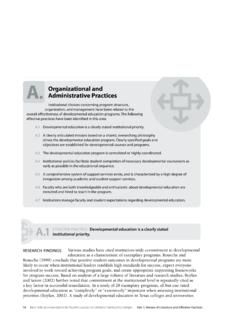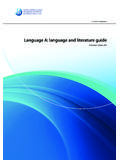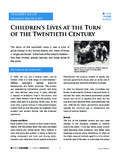Transcription of Contextualized Teaching & Learning: A Faculty Primer
1 Contextualized Teaching & Learning: A Faculty Primer A Review of Literature and Faculty Practices with Implications for California Community College Practitioners Spring 2009. In Association with the Center for Student Success/RP Group and the Academic Senate for California Community Colleges Basic Skills Initiative Bay Area Workforce Funding Collaborative CSS The Center for Student Success The Research and Planning Group for California Community Colleges The Academic Senate for California Community Colleges Funded by the Chancellor's Office of the California Community Colleges Acknowledgements This project is part of the California Basic Skills Initiative aiming to build a toolkit for community college practitioners in the field of basic skills education. The series of literature reviews began in 2007 with the publication of Basic Skills as a Foundation for Student Success in California Community College (Center for Student Success, 2007). The current report is one of a number of follow-up projects to the initial literature review.
2 The authors surveyed published literature and interviewed California and national community college Faculty and program directors to compile this Primer . The report was then read by members of the review panel identified below. Special thanks are due to the Bay Area Workforce Funding Collaborative (BAWFC) for its support of this project. BAWFC is a partnership of over a dozen California and national foundations which leverages public and private philanthropic investments to support workforce development programs in the San Francisco Bay Area. Contents About the Authors.. 1. Introduction.. 3. A Case for Contextualized Teaching and Learning (CTL).. 4. How prepared are today's students for the 21st century workforce?.. 4. How are California Community Colleges addressing the skills gap? .. 5. What is Contextualized Teaching and Learning? .. 6. What learning theory supports CTL? .. 9. Contextualized Teaching and Learning in Practice.. 15. Intensive Introduction to Composition Reading and Writing.
3 21. Basic Math Skills for Statistical Process Control .. 24. Elementary and Intermediate Algebra .. 27. Introduction to Automotive Technology/Shifting Gears Initiative .. 31. Utilities and Construction Prep Program/Career Advancement Academy .. 35. FastStart@CCD .. 39. Digital Bridge Academy .. 43. Daraja Project .. 47. Bridge to Biotech Lab Assistant Certificate Program .. 51. Spanish to English Associate Teacher Certificate Program .. 55. I-BEST Certified Nurse Assistant Program .. 58. Considerations for Implementing CTL .. 61. Conclusion .. 65. References .. 66. Appendix Faculty Interview Protocol.. 71. Contextualized Teaching & Learning: A Faculty Primer |1. About the Authors Elaine DeLott Baker is the former Principal Investigator of the Colorado Lumina Initiative for Performance and the director of She consults nationally on issues of accelerated remediation, career pathways, and adult education/community college transitions. Through her work with the Hewlett Foundation, Elaine began working collaboratively with the Research and Planning Group and the Carnegie Foundation for Teaching and Learning.
4 In the last two years she has served as a visiting team member for the Hewlett Leaders of Student Success recognition project, which honors California community colleges for their leadership in basic skills. Laura Hope is the Interim Dean of Instructional Support at Chaffey College, where she has spent the past twenty years of her career as an English instructor and Basic Skills leader and advocate. She was a founder and has coordinated Chaffey's nationally recognized Success Centers and the Associate's Degree Program for the California Institution for Women. In addition to her work at Chaffey, Laura is a contributing writer to Basic Skills as a Foundation for Student Success in the California Community Colleges. Kelley Karandjeff is a researcher with the Research and Planning Group for California Community Colleges'. Center for Student Success and a coordinator with the Office of Career and Technical Education at City College of San Francisco (CCSF). She has over a decade of program development, implementation and evaluation experience with a particular focus on CTE at the community college and secondary levels.
5 Kelley recently served as member of CCSF's Basic Skills Planning Committee through which she co-led a Faculty initiative to examine issues of basic skills instruction in occupational programming. Additional Contributions The Research Team extends warm appreciation to the many Faculty and program directors interviewed for the purposes of this Primer . Interviewees include the following: Diego Navarro Cabrillo College; Tom deWit Chabot College; Laurence Clement, James Lewis, Robert Reed, Robert Yung and Carin Zimmerman City College of San Francisco; Daniel Keller College of San Mateo; Kristin Cutaia, Ruth Brancard, Rosalinda Martinez and Lisa Silverstein Community College of Denver; Phillip Sutton and Roberto Pandolfi El Camino College; Rod Brown and Mark Lammers Ivy Tech Community College of Indiana; Myra Snell Los Medanos College; Kelly Dodge, Wally Hanley, Allison Tom-Muira, Tom Vessella Los Angeles Trade-Technical College; Sandra Corona and Angelina Stuart Southwestern College; Jon Kerr Lower Columbia College.
6 The Research Team also greatly appreciates the vital feedback and guidance of its review panel including the following members: Julie Adams Executive Director, Academic Senate for California Community Colleges;. Norena Norton Badway Associate Professor/Director of Higher Education Leadership, University of the Pacific; Dianna Chiabotti Coordinator Child and Family Studies and Academic Senate President, Napa Valley College; Karolyn Hanna PhD, MSN, RN, Professor of Nursing, Santa Barbara City College; Davis Jenkins Senior Research Associate, Community College Research Center, Teachers College, Columbia 2| Contextualized Teaching & Learning: A Faculty Primer University; and Lin Marelick CTE Contextualized Teaching and Learning Grant Director, Academic Senate for California Community Colleges. Project Director Dr. Robert Gabriner directed the project. He is Director of the Research and Planning Group for California Community Colleges and its Center for Student Success.
7 Research and Planning (RP) Group for California Community Colleges The Research and Planning Group for California Community Colleges (RP Group) strengthens the ability of California community colleges to undertake high quality research, planning, and assessments that improve evidence-based decision making, institutional effectiveness, and success for all students. It does so through three primary strategies. First, RP's Center for Student Success (CSS) conducts research and evaluation projects that utilize the skills and unique perspectives of California community college institutional researchers, Faculty , and administrators. Second, the RP Group builds the skills of administrators, Faculty , and staff through a broad range of professional development offerings and by disseminating effective practices. Finally, the RP Group develops strategic partnerships and provides leadership on statewide initiatives to help keep evidenced-based decision making, accountability, and student success at the forefront of California community college efforts.
8 Since 2000, CSS has led 15 system-level research and evaluation projects that have resulted in significant changes to the California community college system, including the laying of the groundwork for the statewide accountability system (ARCC), the modification of admission requirements for the registered nursing programs, and the publication Basic Skills as the Foundation for Success in the California Community Colleges, which was instrumental in the development of the Basic Skills Initiative and provided the framework for evaluating college-level basic skills programs throughout the state. The success of CSS projects is rooted in their design. Each project is led by a unique team of community college staff, Faculty , and administrators who have proven research skills and a direct understanding of the subject at hand. Projects culminate in audience-specific products that stimulate discussion, improve outcomes, and strengthen student success. You can find out more about CSS research and the RP Group at Contextualized Teaching & Learning: A Faculty Primer |3.
9 Introduction The following report offers California community college Faculty a closer look at Contextualized Teaching and learning (CTL) as a promising set of strategies and practices that can be expanded through the state's Basic Skills Initiative. The report is relevant to a range of instructional and counseling Faculty , including academic and career and technical education (CTE), Mathematics, English and English as a Second Language (ESL) instructors, as well as to basic skills staff and administrators. The report is organized into three main sections: (1) a case statement for Contextualized Teaching and learning that draws on relevant research and learning theory and situates the practice within workforce development, (2) a review of a range of Contextualized Teaching and learning practices, told from the Faculty /. program director perspective, and (3) a set of considerations for community college Faculty and leaders as well as funders and policy makers interested in the potential of Contextualized Teaching and learning to strengthen student success.
10 4| Contextualized Teaching & Learning: A Faculty Primer A Case for Contextualized Teaching and Learning How prepared are today's students for the 21st century workforce? Most instructors would agree that the average skill level of learners who enroll in post- secondary education is not what it used to be. However, this need not be seen as a condemnation, but rather as a starting point for rethinking how community colleges can meet the educational challenges of an increasingly diverse student population. As open access institutions, community colleges are the most frequent point of entry into post-secondary education for low-income populations, regardless of their academic preparation. This combination of affordability and access has made the community college the single most significant democratizing force in higher education. However, for students to reach their goals for expanded opportunities and economic stability, they must often begin by addressing their lack of academic preparation.








